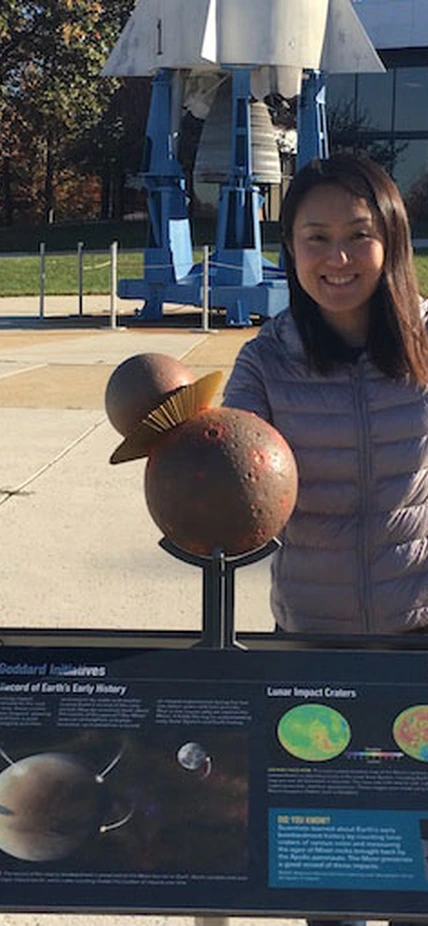Postdoctoral researcher at the Department of Terrestrial Magnetism (DTM), Miki Nakajima, has been awarded the eighth Postdoctoral Innovation and Excellence Award (PIE). These prizes are made through nominations from the departments and are chosen by the Office of the President. The recipients are awarded a cash prize for their exceptionally creative approaches to science, strong mentoring, and contributing to the sense of campus community.
Miki is a planetary geophysicist who joined Carnegie in 2015 from the California Institute of Technology, where she received her Ph.D. She uses computational methods to study the formation of planets and their satellites to predict the dynamics of planetary impacts and how impacts affect the young planetary objects. Her abilities transcend astronomy, geochemistry, and geophysics. She works across traditional disciplines within and outside the department.
Miki is an innovative modeler who adopts multiple methods while developing benchmarks to test their accuracy. She has branched out to enhance her modeling ability with new techniques for planet formation and internal planetary evolution.
Her work on the large Moon-forming impact has received broad attention because it predicts that after the large impact the Earth was mostly stratified. This conclusion is important to the initial evolution and dynamical mixing of the Earth's mantle and core, which connects strongly to the observational data obtained by DTM geochemists and models of mantle evolution conducted by DTM geodynamicists.
Miki also demonstrated that, after the impact, volatile loss was inefficient. This helps to resolve the dilemma that the high-energy impact would be expected to have boiled off all vapor. But that measurements of lunar rocks made at DTM show they retained relatively high-water content.
Miki has proven to be a valued member of the Carnegie community. She organizes activities that range from annual poster sessions to interdisciplinary reading groups and she serves as a postdoctoral representative. She also assists with hosting international visitors and various social activities. Her work has resulted in an invitation to contribute a News & Views opinion piece in Nature Geoscience, and a job offer from the University of Rochester, where she will be an assistant professor in the fall of 2018.
Miki received her M. Sc. and B. Sc. in Earth and planetary sciences from the Tokyo Institute of Technology.
Director of Terrestrial Magnetism, Rick Carlson, remarked, “Miki's great breadth of interests and considerable energy have allowed her to leverage the diverse expertise of the DTM staff to create a body of work during her postdoc that will have a major and lasting impact on a variety of fundamental topics in the planetary sciences."
Top Image Caption: Nakajima with the proto-Earth and an impactor that hit the Earth and formed the Moon (taken at NASA Goddard). Photo courtesy of Miki Nakajima.
